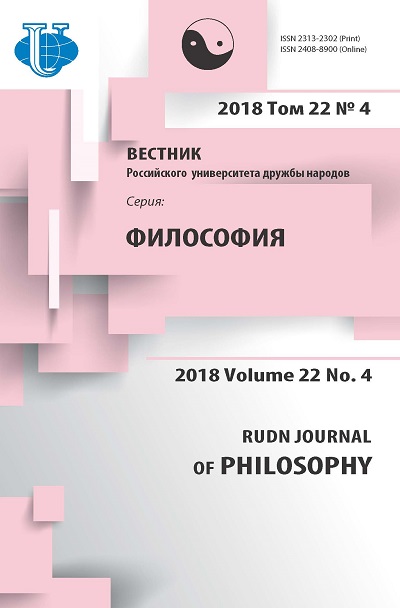SENSUALITY IN THE PHILOSOPHICAL AND ANTHROPOLOGICAL CONCEPT OF MARX-ANTIUTOPIST
- Authors: Kolomiets GG1, Lyasheko PV1
-
Affiliations:
- Orenburg State University
- Issue: Vol 22, No 4 (2018)
- Pages: 434-445
- Section: KARL MARX’S 200TH ANNIVERSARY
- URL: https://journals.rudn.ru/philosophy/article/view/20486
- DOI: https://doi.org/10.22363/2313-2302-2018-22-4-434-445
- ID: 20486
Cite item
Full Text
Abstract
As you know, Marx’s idea of the relationship between the methods of production of material life and the processes of social, political, spiritual life, indicates the interdependence of consciousness and objective reality. At the same time, consciousness, which operates with ideal-model forms on the basis of sensory perception and has a creative ability, acts as a social product from the very generation of people. Modern conditions of technogenic civilization induce to search of philosophical thought about balance of sensual and rational approaches in creative and destructive activity of the person. The authors of the article, adhering to the anthropo-axiological method and the idea of “utopia of ethnic symbiosis” as the possibility of the existence of the global world, pay attention to the role of the sensual principle in Marx’s theory. The article deals with the phenomenon of sensuality in the context of the anti-utopian approach in the philosophical-anthropological concept K. Marx. The authors refer to the fact that the thinker in his early economic and philosophical works notes the importance of the “essential forces of man”, sensuality, inextricably linked with consciousness and which is a prerequisite for practical and spiritual-practical activity. Sensuality, conditioned by a developed bodily organization and developed psyche, is a way of creating objective, actual being. It acts as “the feelings of a social person” and “the richness of subjective human sensuality”, capable of enjoyment, which is a feature of “human essential forces”. At the same time, the authors note that K. Marx, for whom communism is the form and principle of the future, and not utopia, deliberately refuses to develop ideal models of sociality, referring to the material, practical side of human activity on the basis of subject-object interactions that actually transform the existence of man with the significance of human essential forces. For the purpose of critical analysis of utopian problems, as a starting thesis Marx proclaims not only a conscious departure from utopian, as inappropriate to the needs of the modern stage of development of society, i.e. the Mature state of capitalist production and Mature class relations, but also defines a different conceptual and methodological formulation of the problem of man and his attitude to the outside world. It is in the problem field of anthropological theory that allows us to rethink the value of human life itself, the contradictions in the activities of a person interacting with society and the state, that the problem of utopian in the philosophical system of K. Marx is solved. The thinker declares the end of utopia, creating a theoretical and conceptual basis for the subsequent philosophical dilemma “utopia - anti-utopia”.
About the authors
G G Kolomiets
Orenburg State University
Author for correspondence.
Email: kolomietsgg@yandex.ru
доктор философских наук, профессор, профессор кафедры философии и культурологии Оренбургского государственного университета
Prospect Pobedy, 13, Orenburg, Russian Federation, 460018P V Lyasheko
Orenburg State University
Email: lyashenkopavel@rambler.ru
кандидат философских наук, доцент кафедры общих правовых дисциплин и политологии Оренбургского государственного университета
Prospect Pobedy, 13, Orenburg, Russian Federation, 460018References
- Kolomiets G.G. National Dignity and Utopia of Ethical Symbiosis. Bulletin of the Orenburg State University. 2016(5):31—35. (In Russ.).
- Labika J. Marxism between science and utopia. Scientific Yearbook of the Institute of Philosophy and Law of the Ural Branch of the Russian Academy of Sciences. Institute of Philosophy and Law, UrB RAS. 2004(5):268—293. (In Russ.).
- Analysis of the structure and dynamics of science in a sociocultural context. Materials of discussion of selected works of VS. Stepina. Issues of Philosophy. 2017(12):5—31. (In Russ.).
- Porus V.N. Rationalism. New philosophical encyclopedia: In 4 vols. T. 3. Moscow: Thought; 2010:422—424. (In Russ.).
- Frank S.L. The Heresy of Utopianism. Quintessence. Philosophical almanac. Moscow: Politizdat; 1992:378—395. (In Russ.).
- Marx Engels Werke (MEW). Berlin, Diert, Verlag, 1972. T. 4.
- Marx K. Economical-philosophical manuscripts of 1844. Economical-philosophical manuscripts of 1844 and other early philosophical works. Moscow: Academic Project; 2010:305—359. (In Russ.).
- Marx K. German ideology. Economical-philosophical manuscripts of 1844 and other early philosophical works. Moscow: Academic Project; 2010: 388—472. (In Russ.).
- Kondrashov P.N. Philosophy of the Praxis of Karl Marx. Questions of Philosophy. 2016(10):69—80. (In Russ.).
- Marx K. Theses on Feuerbach. Economical-philosophical manuscripts of 1844 and other early philosophical works. Moscow: Academic Project; 2010: 385—387. (In Russ.).
- Bloch E. The principle of hope. Utopia and utopian thinking: anthology. Moscow: Progress; 1991: 49—78. (In Russ.).
- Gert V.A. Integrity and subjectivity of individual human being [dissertation]. Chelyabinsk; 2016. Available from: http://chgik.ru/sites/default/files/dissovet01_gert_disser.pdf. (In Russ.).
- Frolov I.T. Towards a single science of man. Nature. 1985(8): 58—69. (In Russ.).
- Korsakov S.N. On the universality and uniqueness of man. Questions of philosophy. 2012(4): 167—175. (In Russ.).
- Mannheim K. Ideology and Utopia. Moscow: Institute for Scientific Information in Social Sciences; 1976. (In Russ.).
- Grigoryan B.T. Philosophical anthropology: (Critical essay). Moscow: Thought; 1982. (In Russ).
- Stepin V.S. Civilization and culture. St. Petersburg: SPbGUP; 2011. (In Russ.).
Supplementary files















